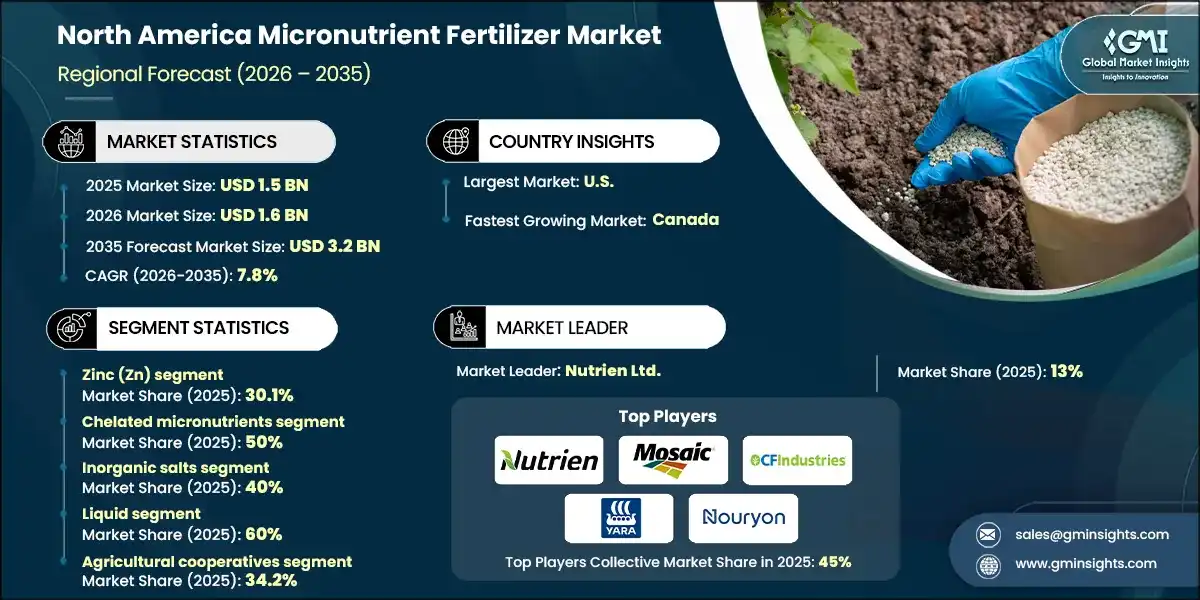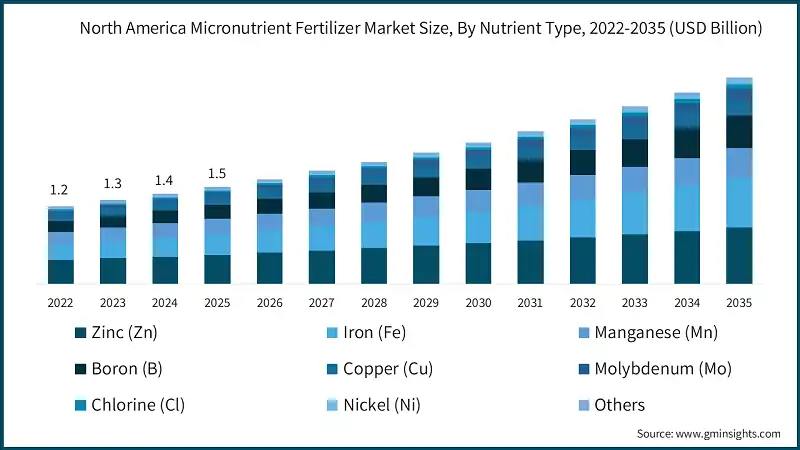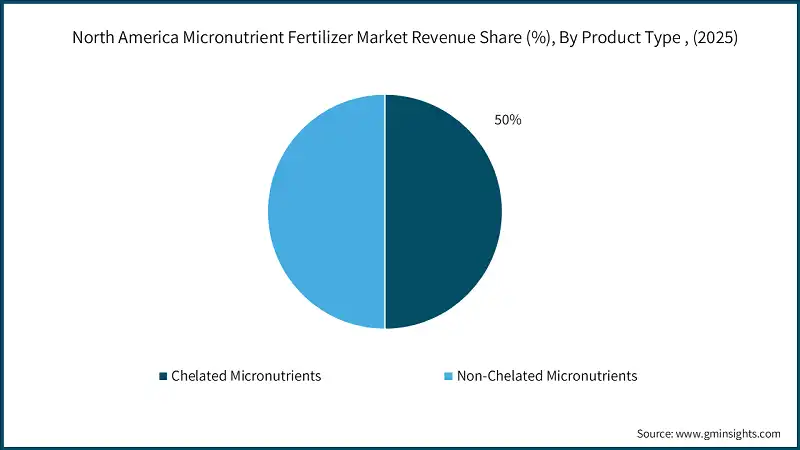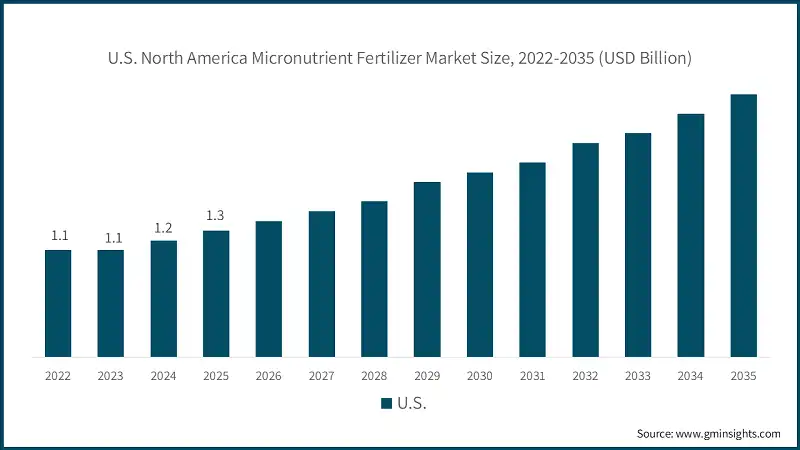Summary
Table of Content

North America Micronutrient Fertilizer Market
Get a free sample of this report
Form submitted successfully!
Error submitting form. Please try again.
Thank you!
Your inquiry has been received. Our team will reach out to you with the required details via email. To ensure that you don't miss their response, kindly remember to check your spam folder as well!

Request Sectional Data
Thank you!
Your inquiry has been received. Our team will reach out to you with the required details via email. To ensure that you don't miss their response, kindly remember to check your spam folder as well!
Form submitted successfully!
Error submitting form. Please try again.
North America Micronutrient Fertilizer Market Size
The North America micronutrient fertilizer market was valued at USD 1.5 billion in 2025. The market is expected to grow from USD 1.6 billion in 2026 to USD 3.2 billion in 2035, at a CAGR of 7.8% according to latest report published by Global Market Insights Inc.

To get key market trends
- The North American market of micronutrient fertilizers is witnessing significant growth because farmers and agri-businesses are out there to bring back health to the soil and also to cure nutrient deficiencies for improving crop productivity. These fertilizers are widely used in cereals, oilseeds, fruits, and vegetables, thereby helping to meet the required balanced nutrition and promote sustainable agricultural practices. The market is largely tilted towards green alternatives with precision agriculture striving to optimize resource use against any negative effects on the environment.
- The market is buoyed increasingly by technological advancements and frameworks of sustainability. Hybrid polymer formulations, low volatile organic content systems, and similar formulations attract attention as they become the norm for shipbuilding and operation in compliance with strict environmental regulation. Not only do they provide better performance in extreme marine conditions, but they also boast compliance with world decarbonization goals.
- Regionally, the US has been at the fore front in adoption owing to well developed farming infrastructure coupled with sustainability initiatives; Canada on the other hand emphasizes cereals and oil seeds with an eye on eco-friendly formulations. Another opportunity in micronutrient solutions for high-value crops will exist in Mexico, given its horticulture and fruit production sector boom. North America is accordingly positioned strategically as the new age of sustainable micronutrient fertilizers set in motion in line with the modern agricultural agenda.
North America Micronutrient Fertilizer Market Report Attributes
| Key Takeaway | Details |
|---|---|
| Market Size & Growth | |
| Base Year | 2025 |
| Market Size in 2025 | USD 1.5 Billion |
| Market Size in 2026 | USD 1.6 Billion |
| Forecast Period 2026 - 2035 CAGR | 7.8% |
| Market Size in 2035 | USD 3.2 Billion |
| Key Market Trends | |
| Drivers | Impact |
| Increasing demand for high-yield crops to meet food security needs | Fertilizer companies have ramped up production as these fertilizers are quickly adopted by farmers to enhance productivity and food security |
| Rising awareness among farmers about soil nutrient deficiencies | Speeding up the market acceptance through informed purchase decisions and targeted applications |
| Government initiatives promoting sustainable agricultural practices | Enabling environment for regulating and, thus stimulating the demand for biodegradable formulations |
| Pitfalls & Challenges | Impact |
| High costs associated with micronutrient fertilizers | Major impediment to price-conscious users and hence the overall growth of the market remains slow |
| Limited awareness in remote farming regions | Reduces market reach and, as a result, slower adoption |
| Opportunities: | Impact |
| Technological advancements in fertilizer formulations | Developing very efficient crop-specific products memorial-buildup by their competitive edges |
| Expansion of organic farming practices requiring micronutrient inputs | Alternative income-generating opportunities for bio-based micronutrient solutions as alignments to sustainability trends |
| Market Leaders (2025) | |
| Market Leaders |
13% market share |
| Top Players |
|
| Competitive Edge |
|
| Regional Insights | |
| Largest Market | U.S. |
| Fastest growing market | Canada |
| Future outlook |
|
What are the growth opportunities in this market?
North America Micronutrient Fertilizer Market Trends
- Micronutrient fertilizer has become important not only as an agricultural input but one which actually helps soil health, resistance, and sustainability of crops. They now stand important towards stringent environmental regulations compliance and regenerative agriculture. In tandem with the global mandate of reducing emissions and resource-efficient agriculture, the role these now play in making it essential cannot be understated.
- Technology innovation is what comes into play with all these changes-- by creating stimulating new formulations like the chelated, water-soluble, and bio-based alternatives which improve nutrient uptake, reduce losses, and lighten life cycle environmental burdens. Resource-use efficiency is enhanced by integrated production systems and precision farming tools, thus economically and strategically falling in line with the principles of the circular economy with micronutrient fertilizers.
- Market trends that steer predictive nutrient management and on-demand crop nutrition strategies via digital platforms or data-driven solutions will emerge for smart agriculture. This trend allows now the character of micronutrient fertilizers as performance enablers with scope expanded to encompass improvement of soil health and compliance with sustainability frameworks in organic and high-value crop systems. Therefore, innovation and environmental stewardship shall continue to focus North America as a focal country for these products in future farming.
North America Micronutrient Fertilizer Market Analysis

Learn more about the key segments shaping this market
Based on nutrient type, the market is segmented into Zinc (Zn), Iron (Fe), Manganese (Mn), Boron (B), Copper (Cu), Molybdenum (Mo), Chlorine (Cl), Nickel (Ni), Others. Zinc (Zn) dominated the market with an approximate market share of 30.1% in 2025 and is expected to grow with a CAGR of 6.8% by 2035.
- Zinc (Zn) is an essential element for enzyme activation and growth regulation. This continues to form the basis of cereals and oilseeds. Iron (Fe) plays a very important role in the formation of chlorophyll and its efficient use in photosynthesis in high-value horticultural crops. Manganese (Mn) supports the metabolism process and resistance against infectious diseases. Boron (B) plays a crucial role in reproductive development and importance in fruit quality for orchards and vegetables, making it useful for orchards and vegetables.

Learn more about the key segments shaping this market
Based on product type, the North America micronutrient fertilizer market is segmented into chelated micronutrients, non-chelated micronutrients. Chelated micronutrients held the largest market share of 50% in 2025 and is expected to grow at a CAGR of 9.8% during 2026-2035.
- Chelated formulations are therefore highly valued in precision agriculture systems where controlled delivery of nutrient and affinity with fertigation practices would maximize crop performance.
- Typically, non-chelated micronutrients hold considerable importance in conventional agricultural practices and where costs are sensitive. These products are widely applied, either bulk or blended, with macronutrient fertilizers as an inexpensive answer to many soil deficiency problems. Though lacking chelated form stability in prolonged application, non-chelated micronutrients hold importance in crops grown on soils with good nutrient retention characteristics.
Based on formulation type, the North America micronutrient fertilizer market is segmented into inorganic salts, synthetic chelates, organic complexes, nano-formulations. Inorganic salts segment dominated the market with an approximate market share of 40% in 2025 and is expected to grow with the CAGR of 4.7% by 2035.
- Inorganic salts have continued to be in use, mainly due to cost-effectiveness and ease of application, especially under the conventional farming system. They provide essential nutrients in readily available forms but are prone to leaching and generally less available in difficult soil environments.
- Synthetic chelates are the most promising area since they have excellent stability and nutrient availability at high pH level.
Based on form, the North America micronutrient fertilizer market is segmented into liquid, dry/granular. Liquid segment dominated the market with an approximate market share of 60% in 2025 and is expected to grow with the CAGR of 9.5% by 2035.
- There is a growing market trend for flexible application and performance components into the North America micronutrient market. It is also a gradual entrance for liquid formulations into the application popularity release and compatibility with the modern irrigation systems, and it works fine in precision and high-value agriculture that requires uniform application and immediate nutrient availability.
- The dry or granular forms of micronutrients, however, are still prominent for broadacre crops and conventional farming modalities. They are easy to handle and economical, and they can be bulk-blended with macronutrient fertilizers.
Based on distribution channel, the North America micronutrient fertilizer market is segmented into agricultural cooperatives, independent distributors & retailers, direct-to-farm sales, e-commerce & online platforms. Agricultural cooperatives dominated the market with an approximate market share of 34.2% in 2025 and is expected to grow with the CAGR of 4.4% by 2035.
- Agricultural cooperatives serve as the local hubs for micronutrient fertilizers, information, and ownership. They bundle together soil tests, agronomic recommendations, and buying inputs, thus allowing member growers to adopt unique micronutrient program practices compliant with sustainability standards as well as precision practices.
- Independent distributors and retailers are local experts with customized formats to provide responsive services. They actually develop portfolios out of chelated, non-chelated, organic, and specialty blends to equip the micro-regional soil conditions and crop systems to match.

Looking for region specific data?
The North America North America micronutrient fertilizer industry is growing rapidly on the global level with in 2025.
- North America emerged as the hub for micronutrient fertilizers. The precision and regenerative agricultural practices emphasized by the region create extremely valuable opportunities for innovative formulations that increase nutrient efficiency and environmental compliance. Micronutrient fertilizers in this context would serve productivity and resilience in modern crop systems.
U.S. dominates the North America micronutrient fertilizer market with market share of 87.1% in 2025, showcasing strong growth potential.
- The U.S. dominate this region market with a strong farming infrastructure complemented by the wide-scale adoption of precision technologies and favorable policy environments for sustainable nutrient management.
Canada Micronutrient Fertilizer market showcasing strong growth potential with market share of 12.8% in 2025.
- In addition, this growth is complemented by the focus that Canada places on cereals, oilseeds as well as high-value crops, wherein micronutrient deficiencies are increasingly being dealt with through specific solutions.
North America Micronutrient Fertilizer Market Share
The top 5 companies in North America Micronutrient Fertilizer industry include Nutrien Ltd., The Mosaic Company, CF Industries Holdings, Inc., Yara International ASA, Nouryon (formerly AkzoNobel). These are prominent companies operating in their respective regions covering approximately 45% of the market share in 2025. These companies hold strong positions due to their extensive experience in North America micronutrient fertilizer market. Their diverse product portfolios, backed by robust production capabilities and distribution networks, enable them to meet the rising demand across various regions.
- Nutrien Ltd. is a global supplier of crop inputs and services, extending its offer in broad fertilizer, crop protection chemistry, and digital agronomy solutions with its integrated approach to crop nutrition and sustainable farming.
- The Mosaic Company produces and markets potash and phosphate concentrated crop nutrients. The product lines include market offerings to agricultural markets and cover the entire chain of operations from mining to processing and distribution.
- CF Industries Holdings, Inc. is a manufacturer and distributor of fertilizers with nitrogen and economy-based business operations through large-scale production plants and supply chain capabilities that deliver ammonia, urea, and related products for agriculture and industrial applications into the marketplace.
- Yara International ASA sees itself as an eminent provider of crop nutrition solutions. Providing mineral fertilizers and other precision farming tools, the firm calls out sustainable farming through its integrated products and its promotional services, which enhance the soil health and derive maximum benefit.
- Nouryon does specialty chemicals where most of its portfolio includes chelated micronutrients and crop nutrition products. Here, the focus is on innovating chemical formulations for safe delivery and compatibility with the improved farming mechanisms while making proper nutrient waste use within the systems.
North America Micronutrient Fertilizer Market Companies
Major players operating in the North America micronutrient fertilizer industry include:
- Nutrien Ltd.
- The Mosaic Company
- CF Industries Holdings, Inc.
- Yara International ASA
- Nouryon (formerly AkzoNobel)
- Haifa Group
- Koch Agronomic Services
- Helena Agri-Enterprises, LLC
- The J.R. Simplot Company
- Wilbur-Ellis Company LLC
- GreenPoint AG
- BioAg (Novozymes)
- Down To Earth Distributors, Inc.
North America Micronutrient Fertilizer Industry News
- In May 2021, Koch Agronomic Services (KAS) acquired Compass Minerals' North American micronutrient assets, including global IP rights, trademarks, patents, and products like Hydro Bullet, Wolf Train, and Rocket Seeds. This acquisition enhanced KAS's ability to provide high-quality and efficient products to customers.
- In October 2025, BASF expanded its micronutrient portfolio with a new chelated zinc-iron blend fertilizer, enhancing corn yield by 15% in Midwest trials amid soil deficiency challenges. This launch targets high-demand row crops, integrating drone-compatible formulations for precision application.
- In September 2025, Corteva Agriscience introduced a boron-manganese foliar spray under its Pioneer brand, approved for organic use and boosting soybean quality in key states. The product addresses widespread micronutrient gaps from intensive farming, with early adopter reports showing improved disease resistance.
North America micronutrient fertilizer market research report includes in-depth coverage of the industry, with estimates & forecasts in terms of revenue (USD Billion) and volume (Kilo Tons) from 2022 to 2035, for the following segments:
Market, By Nutrient Type
- Zinc (Zn)
- Iron (Fe)
- Manganese (Mn)
- Boron (B)
- Copper (Cu)
- Molybdenum (Mo)
- Chlorine (Cl)
- Nickel (Ni)
- Others
Market, By Product Type
- Chelated micronutrients
- EDTA chelates
- DTPA chelates
- EDDHA chelates
- Others (HBED & advanced)
- Non-chelated micronutrients
Market, By Formulation Type
- Inorganic salts
- Synthetic chelates
- Organic complexes
- Nano-formulations
Market, By Form
- Liquid
- Dry/granular
Market, By Distribution Channel
- Agricultural cooperatives
- Independent distributors & retailers
- Direct-to-farm sales
- E-commerce & online platforms
The above information is provided for the following regions and countries:
- North America
- U.S.
- Canada
Frequently Asked Question(FAQ) :
Which form segment dominated the North America micronutrient fertilizer market?
Liquid formulations dominated the market with a share of around 60% in 2025. Their leadership is driven by compatibility with modern irrigation systems, uniform application, and rapid nutrient availability.
Which distribution channel leads the North America micronutrient fertilizer market?
Agricultural cooperatives dominated the market with a 34.2% share in 2025. Their role in providing agronomic advice, soil testing, and bundled input solutions supports strong farmer adoption.
Which country dominates the North America micronutrient fertilizer industry?
The U.S. dominated the market with an 87.1% share in 2025, driven by advanced farming infrastructure, high adoption of precision agriculture, and favorable sustainability-focused policies.
Who are the key players in the North America micronutrient fertilizer market?
Key players include Nutrien Ltd., The Mosaic Company, CF Industries Holdings, Inc., Yara International ASA, and Nouryon (formerly AkzoNobel). These companies focus on innovation, sustainable formulations, and strong distribution networks to maintain market leadership.
Which formulation type led the market in 2025?
The inorganic salts segment led the market with approximately 40% share in 2025. Cost-effectiveness, ease of application, and widespread use in conventional farming supported its leading position.
What was the market share of chelated micronutrients in 2025?
Chelated micronutrients accounted for 50% of the market share in 2025, making them the leading product type. Their dominance is driven by higher nutrient stability, improved uptake efficiency, and strong suitability for precision farming systems.
Which nutrient type dominated the North America micronutrient fertilizer industry in 2025?
Zinc (Zn) dominated the market with a share of 30.1% in 2025. Its leadership is supported by its essential role in enzyme activation, crop growth regulation, and widespread use in cereals and oilseeds.
What is the projected value of the North America micronutrient fertilizer market by 2035?
The market is expected to reach USD 3.2 billion by 2035, growing at a CAGR of 7.8% from 2026 to 2035. Growth is fueled by food security concerns, technological advancements in chelated and bio-based fertilizers, and supportive government initiatives.
What is the market size of the North America micronutrient fertilizer industry in 2026?
The market size for North America micronutrient fertilizers reached USD 1.6 billion in 2026, reflecting steady expansion supported by precision agriculture adoption and improved fertilizer formulations.
What is the North America micronutrient fertilizer market size in 2025?
The North America market for micronutrient fertilizer is valued at USD 1.5 billion in 2025. Market growth is driven by increasing demand for high-yield crops, rising awareness of soil nutrient deficiencies, and the adoption of sustainable agricultural practices.
North America Micronutrient Fertilizer Market Scope
Related Reports


